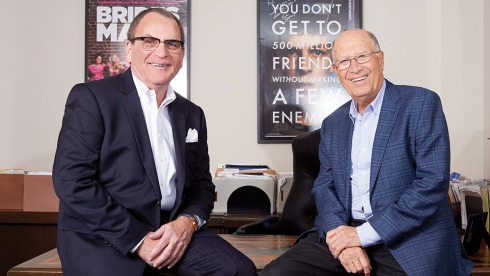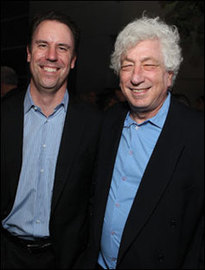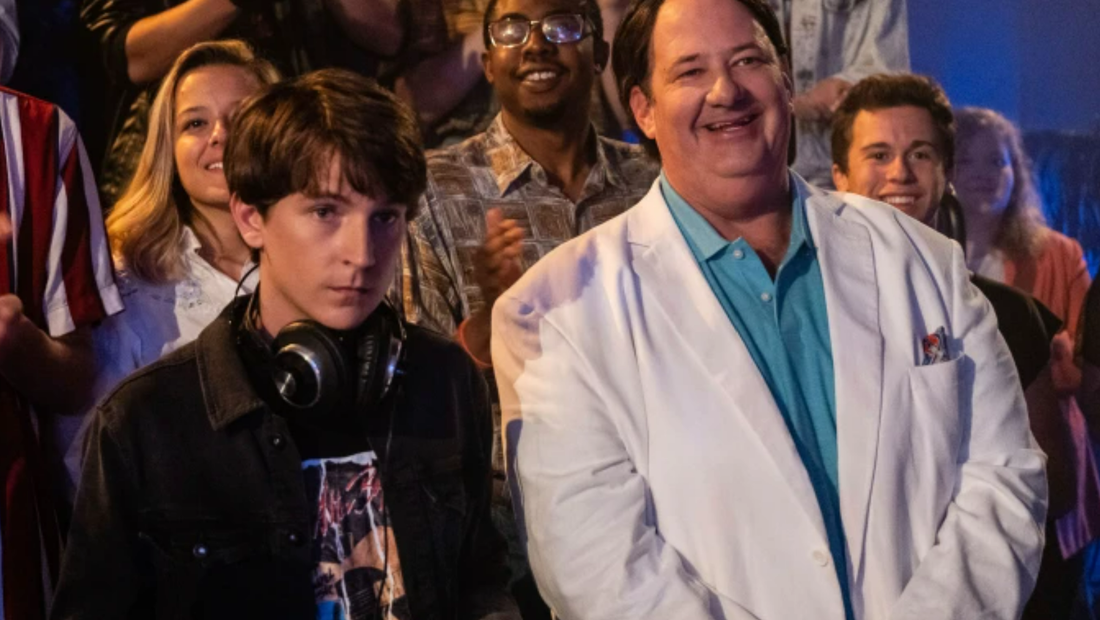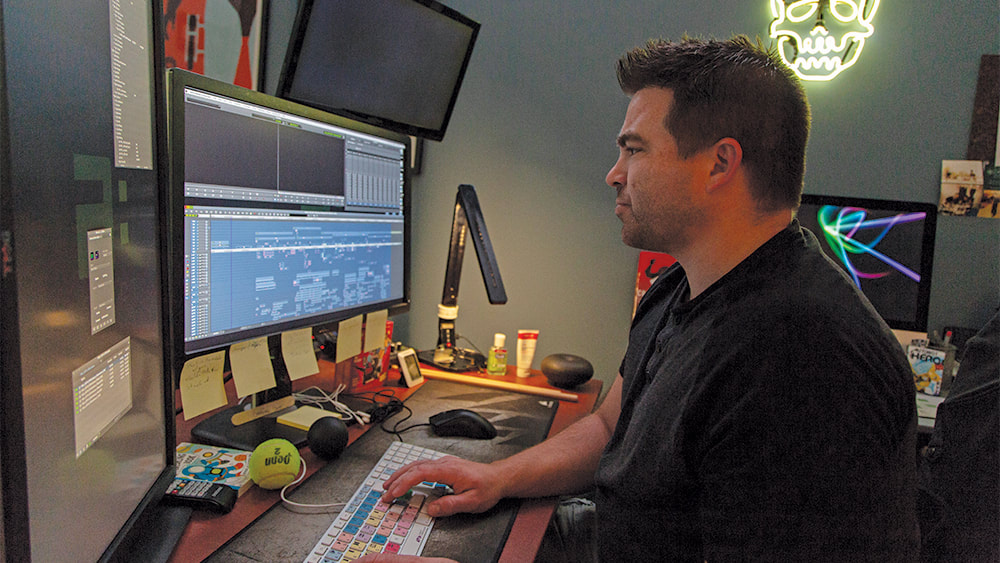Corporate profiles
|
Bondit's Bold Take on Creative Capital
It is often said that the secret to becoming a successful entrepreneur is finding a need and filling it. When Santa Monica-based BondIt Media Capital launched in 2013, it zeroed in on the deposits productions must leave with SAG-AFTRA, DGA, IATSE and other guilds to ensure that their members get paid in a timely fashion.
The company co-founders — CEO Matthew Helderman and COO Luke Taylor — knew from their experience working in the production trenches that these deposits, which sometimes take up to six months to be returned, can create a significant cash flow problem for low-budget projects during principal photography. So they decided to offer a deal: producers would pay the unions, then BondIt would reimburse their cash outlay, minus a fee (typically 12%-15%), and collect the deposits when they were returned. It wasn’t exciting, it wasn’t big-time, but it was a foot in the door. How Indie MPX Makes NFTs Part of Its Business Model
Back in July, when film sales company MPX cut a distribution pact with 1091 Pictures for “Electric Jesus,” a comedy about a never-famous ‘80s teen Christian hair metal band co-starring Brian Baumgartner (NBC’s “The Office”), it negotiated NFT (non-fungible token) and digital collectible rights as part of the deal. Given that NFTs — unique data files (representing photos, audio, video, etc.) that use blockchain technology to provide verifiable proof of ownership — are probably the most talked- about and least understood trend in the worlds of investing, art and technology, it’s reasonable to wonder exactly this means.
So Variety talked to MPX CEO Andrew James Felt, who co-founded the company with senior VP of sales and acquisitions Ryan Bury in late 2019, about how NFTs can be a viable revenue stream for filmmakers and what part they will play in his sales strategy at AFM, where MPX is representing 45 films ranging from the comedy “Faith Based” to the sci fi thriller “Transference: Dark Mutants.” Imax CEO Richard Gelfond on Big Screen Challenges
Every February for the past several years, New York-based Imax CEO Richard Gelfond has come to Los Angeles for a month-long visit to work out of the company’s $45 million Playa Vista offices, next door to Google, YouTube, Facebook and Microsoft, in the heart of Silicon Beach.
“The Academy Awards are coming, lots of people are in town, so it’s a great time to get external meetings,” Gelfond says. Besides, he adds with a wink, “February is as good a month to leave New York and be in L.A. as any.” Gelfond is sitting at his desk in his second-floor office, beneath a poster for this year’s big Oscar contender, “Dunkirk"... Check out the other articles in the issue:
Imax Expands Big-Screen Ambitions on Global Scale Imax Turbo-Charges Box-Office Prospects Imax Keeps Updating Itself at Breakneck Pace Imax Explores New Tech Horizons Beyond Big Screen Seismic Productions: 25 Years of Shaking Up the Business
It was a Saturday in 1992, and Seismic Productions co-owner David Schneiderman was sweeping his porch in preparation for his birthday party when the phone rang with a call from Bob Weinstein, asking for changes on the trailer for his Miramax political satire “Bob Roberts.”
Schneiderman told him he’d tackle it when he got back to the office on Monday. Weinstein told him he needed to do it right away. “I said, ‘But Bob it’s my birthday and I’m having a party or 50 people in a few hours,’ ” Schneiderman remembers. “And he said ‘Well, what better way to celebrate your birthday.’ and I hightailed it into the office!” At the time of Weinstein’s call, Seismic was a scrappy boutique trailer house, competing with big companies like Kaleidoscope, Intralink and the Cimarron Group, and ascendant Miramax was a key client. Today, Seismic has 40 employees and a reputation as one of the top independent trailer houses in Hollywood, but it still jumps when a client calls, regardless of the hour or the day of the week. 
Business Management Firm Tanner Mainstain Celebrates 40 Years
The genesis of business management firm Tanner, Mainstain, Glynn & Johnson (TMGJ) can be traced to a chance meeting on Wilshire Boulevard in 1976.
Bill Tanner and Peter Mainstain were CPAs who had faced off against each other in three-on-three pickup basketball games at Hamilton High in West L.A. One day during tax season, Tanner presented Mainstain with a proposition. “I said, ‘Come in to work with me and eventually you can buy in if you see what you like,’” recalls Tanner, who had a former UCLA fraternity brother at law firm Loeb & Loeb steering clients his way. Mainstain did. And what started as a small practice built around a pair of up-and-coming TV writer-producers, Tom Patchett and Jay Tarses, has grown into a venerable entertainment industry institution with clients ranging from actor Michael Keaton to boxing champion Manny Pacquiao. Also read about Tanner Mainstain's commitment to philanthropy and their real estate investment strategies.
Staples Center 10th Anniversary
People generally don't remember what the neighborhood around 11th and Figueroa in downtown Los Angeles was like back in the '90s, before Staples Center was built. But that's probably because they never went there.
"Unless people worked here or they were attending a performance at the Music Center, they just never bothered to come downtown," says Carol E. Schatz, president and CEO of the Central City Association of Los Angeles, an advocacy group for local businesses. But Lee Zeidman remembers the pre-Staples landscape vividly. "We used to look down on the site from the 27th floor of the TCW building, just as we were starting to dig the hole and condemn some of the buildings," recalls Zeidman, who serves as senior vp and GM of Staples Center and the adjacent Nokia Theatre and L.A. Live for co-owner and operator AEG. "There were dilapidated buildings in various states of decay, different types of liquor stores on the corners. They were basically drug and prostitute hangouts." A mere decade later, Staples has already built a storied history ... 
Entertainment Partners Celebrates 40 Years of Service to Worldwide Film and TV Communities
Few industries have taken greater advantage of digital technology than entertainment. The benefits extend not just to production and exhibition, but also to the behind-the-scenes worlds of accounting, payroll services, budgeting, and scheduling.
And few companies have ridden the digital wave more effectively than Entertainment Partners. When EP first opened its doors in 1976 as Independent Information Services, it focused on automating film and TV accounting — a process that was carried out with reams of paper forms in duplicate and triplicate. Reliance MediaWorks: To Restore & Beyond
In a darkened room on the second floor of a nondescript building tucked away in an industrial area near Bob Hope Airport, a dozen or so young men and women sit at computer workstations equipped with dual 32-inch monitors that are wired into a powerful 300-machine, 1.5-petabyte Linux processing system.
These are the members of Reliance MediaWorks Burbank’s image processing team, and they’re studying and manipulating individual frames of classic and not-so-classic movies such as Michael Powell’s 1943 epic “The Life and Death of Colonel Blimp” and Brian De Palma’s campy 1974 rock ‘n’ roll frightfest “Phantom of the Paradise.” 
APA @ 50: Percentery's Synergies
APA, which began life 50 years ago as the Agency for the Performing Arts, has made a stunning transition from the old to the new. Founded in New York by a group of former MCA agents, the tenpercentery entered a period of significant growth a few years ago. “We’ve been able to triple the business,” says APA prexy and CEO Jim Gosnell.
Key to APA’s expansion: a focus on emerging digital platforms. Today, APA’s agents blanket that world as thoroughly as their predecessors covered the nightclub and theater scenes in their search for emerging stars. |
Digital Studio Pocket.watch Builds Kids’ Biz on YouTube Stars
To get a sense of Pocket.watch’s rapid rise, look no further than the Macy’s Thanksgiving Day Parade.
The start-up was launched by founder and CEO Chris M. Williams in March 2017 with a mere $6 million in Series A funding and the bold goal of taking digital kids and family content creators and turning them into multiplatform franchises. A mere 3 1⁄2 years later, in November 2020, a 42-foot-tall Red Titan balloon depicting the superhero alter ego of Ryan Kaji, star of its top YouTube channel Ryan’s World, floated down 34th Street in Manhattan alongside iconic characters such as Snoopy, SpongeBob and Pikachu. Pioneers at Felix & Paul Studios Break the Mold of Traditional Storytelling
In the world of entertainment tech convergence, there are few nuts harder to crack than live-action virtual reality. The medium presents seemingly endless technical challenges, starting with how to shoot with a camera rig that can see everything all around it, or digitally create the illusion that it can.
Even more daunting are the storytelling challenges faced by filmmakers raised on cuts, close-ups and dolly shots, working in a medium in which edits are considered to be too jarring, camera movement can be nausea-inducing and the viewer’s gaze is free to wander away from the action. For those VR newbies, Felix & Paul Studios chief content officer Ryan Horrigan has some advice: check your baggage at the door. “If you’re coming in thinking it’s cinema, it is a little bit, but not really. And it’s a little bit like theater, but not really,” says Horrigan. “I like to say it’s like literature: you’re placing the viewer inside the subjectivity of a character, or you can be in someone’s dreams, memories or hallucinations. What we’re finding is there are a lot of different narrative shells we can put you in where you feel like you have subjectivity, but we can still give you a narrative story.” Check out the other articles in the issue:
Felix & Paul Studios: Inventing the Future of Content Projects From Felix & Paul Studios Are Fanning Out to Venues Everywhere Felix & Paul Studios Finds Funding Via VR Outfits, Production Incentives and Savvy Distribution Felix & Paul Studios Leaders Forge New Path As Aspect Reaches 40, It Retools for the New Media Age
Creative agency Aspect’s Throwback Thursday Facebook postings of its past work offer a fascinating historical document. They not only showcase highlights from the company’s 40 years in the movie-trailer business such as “Men in Black,” “Misery” and “Wayne’s World,” they’re also a reminder of how much the medium has changed since the days when the sonorous and instantly recognizable voice of narrator Don LaFontaine graced thousands of trailers, promos and ads.
Then and now, Aspect reigns as one of the top trailer houses in Hollywood. Back in the old days, it had a reputation as the go-to place for comedies. But, today, it prides itself on its ability to work on projects of any genre, from “Ready Player One,” “Hell Fest” and HBO’s “Westworld” to “Mamma Mia: Here We Go Again,” as well as every platform, from the big screen to smartphones. Pongo at 25: Shop’s Creative Flair Draws Clients, Moves Audiences
In the crowded world of creative marketing, standing above the crowd requires a unique artistic approach and insight into the minds of audiences.
Take Pongo. Like all producers of spots, the studio’s mission is to sell the unique merits of the programs being advertised. But over the course of its 25 years in the business, the L.A.-based creative marketing agency has developed its own brash, one-of-a-kind audiovisual signature. One of the company’s hallmarks is something it likes to call the “Pongo push” — an ever-so-brief pause in the action where the frame does a quick zoom-in. “It’s a visual moment that grabs your attention,” says Pongo founder, CEO and president Tom McGough. “It takes a breath for a joke, or a beat for a visual reaction onscreen. It’s a way of turning up the heat. It’s in your face.” Timing is Everything for Marketing Agency
Clients want their 30-second spots crammed with as many jokes as possible. But Pongo founder Tom McGough, says that the number of verbal and visual punch lines isn’t as important as the cadence of their delivery.
As the saying goes, timing is everything in comedy. “Other people might just run the whole thing at the same speed, and think that somehow that’s the answer,” adds McGough. “But we think it should be like a roller-coaster. You’re kind of being pulled, pushed and dragged along on this wonderful ride that has moments where you can stop and take a breath, then speed up, then you go into a lap that allows you to laugh in that moment and enjoy a joke. But how you cut that thing up and figure out the craft of it is the hard part.” Also check out "Five Gems That Epitomize Studio's Best Work for Clients."
In this special report, marking the 10th anniversary of Bratz dolls, I interview MGA Entertainment founder and CEO Isaac Larian about how he built his company and his bruising battle with toy giant Mattel (makers of Barbie), which he felt was bent on destroying him.
Larian was vindicated in August 2011 when a judge ordered Mattel to pay MGA $310 million in damages, legal fees, etc. He's a fascinating immigrant success story and seemingly much more honest and open than virtually any Hollywood heavyweight I've interviewed. Production Pipeline Artella Brings Producers, Animators Together Across the Globe in the Cloud
With so many facets of production moving to the cloud, it was only a matter of time before animation made its way up there as well.
The latest platform to enable cloud-based collaboration is Artella, which lets people from around the world partner on animation, video games, visual effects, and virtual-reality content. To its founders, it’s a possible solution to what they see as the creative stagnation plaguing Hollywood. Bento Box: The Animator Behind Fox's 'Bob's Burgers'
The quiet of Bento Box’s offices is broken by a series of screams, interspersed with loud thumps. Heads look up from computer workstations to see that it is not an incident of escalating workplace violence, just some random theatrics by Kristen Schaal, the voice of Louise on the animated Fox series “Bob’s Burgers.” She’s dropped by to loop some dialogue with show creator Loren Bouchard, although her performance appears to have nothing to do with the task at hand.
“Never a dull moment,” laughs Scott Greenberg, who founded animation studio Bento Box in 2009 with Mark McJimsey and Joel Kuwahara. Lessons of Indie War Survivors
 Mark Gill and Avi Lerner. Mark Gill and Avi Lerner.
Why on earth did former Miramax and Warner Independent president Mark Gill join forces with "Expendables" producer Avi Lerner? Is he trying to turn Lerner's onetime direct-to-video factory Nu Image/
Millennium Films into the new Miramax? |













